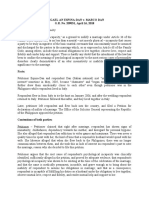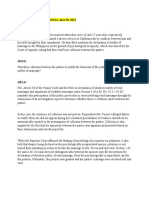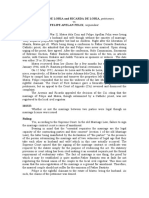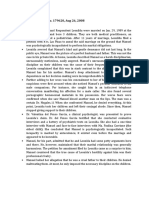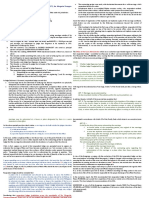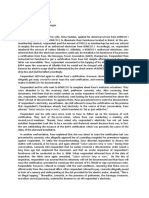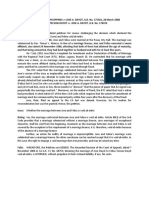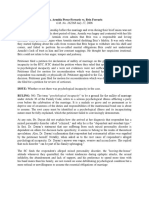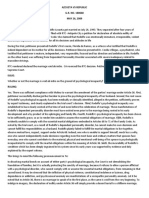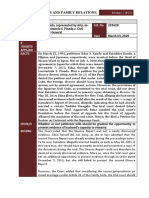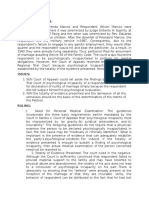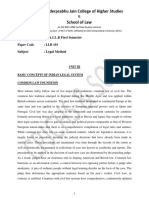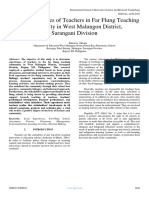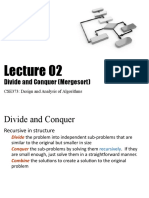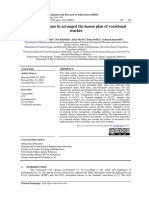Marcos v. Marcos
Marcos v. Marcos
Uploaded by
Sean GalvezCopyright:
Available Formats
Marcos v. Marcos
Marcos v. Marcos
Uploaded by
Sean GalvezOriginal Description:
Copyright
Available Formats
Share this document
Did you find this document useful?
Is this content inappropriate?
Copyright:
Available Formats
Marcos v. Marcos
Marcos v. Marcos
Uploaded by
Sean GalvezCopyright:
Available Formats
BRENDA B. MARCOS petitioner vs. WILSON G. MARCOS respondent.
SUMMARY: Psychological incapacity, as a ground for declaring the nullity of a marriage, may be established by the totality of evidence presented. There is no requirement, however, that the respondent should be examined by a physician or a psychologist as a conditio sine qua non for such declaration. FACTS: Brenda and Wilson were married twice 1) on September 6, 1982 which was solemnized by Judge Eriberto H. Espiritu at the Municipal Court of Pasig and (2) on May 8, 1983 which was solemnized by Rev. Eduardo L. Eleazar, Command Chaplain, Out of their marriage, five (5) children were born "After their marriage on September 6, 1982, they resided at No. 1702 Daisy Street, Hulo Bliss, Mandaluyong, "After the downfall of President Marcos, WILSON left the military service in 1987 and then engaged in different business ventures that did not however prosper. As a wife, BRENDA always urged him to look for work so that their children would see him, instead of her, as the head of the family and a good provider. Due to his failure to engage in any gainful employment, they would often quarrel and as a consequence, he would hit and beat her. He would even force her to have sex with him despite her weariness. He would also inflict physical harm on their children for a slight mistake and was so severe in the way he chastised them. In 1992, they were already living separately. "The 'straw that broke the camel's back' took place on October 16, 1994, when they had a bitter quarrel. As they were already living separately, she did not want him to stay in their house anymore. On that day, when she saw him in their house, she was so angry that she lambasted him. He then turned violent, inflicting physical harm on her and even on her mother who came to her aid. The following day, October 17, 1994, BRENDA and their children left the house and sought refuge in her sister's house. "In the case study conducted by Social Worker Sonia C. Millan, the children described their father as cruel and physically abusive to them "The appellee submitted herself to psychologist Natividad A. Dayan, Ph.D., for psychological evaluation while the appellant on the other hand, did not. The TRIAL COURT found psychological incapacity to fulfill marital obligations. "The court a quo found the appellant to be psychologically incapacitated to perform his marital obligations mainly because of his failure to find work to support his family and his violent attitude towards appellee and their children, HOWEVER, the CA reversed the decision and the CA held that psychological incapacity had not been established by the totality of the evidence presented. Hence this petition.
ISSUES: FIRST - "I. Whether or not the Honorable Court of Appeals could set aside the findings by the Regional Trial Court of psychological incapacity of a respondent in a Petition for declaration of nullity of marriage simply because the respondent did not subject himself to psychological evaluation. SECOND - II. Whether or not the totality of evidence presented and the demeanor of all the witnesses should be the basis of the determination of the merits of the Petition." HELD: We agree with petitioner that the personal medical or psychological examination of respondent is not a requirement for a declaration of psychological incapacity. Nevertheless, the totality of the evidence she presented does not show such incapacity. RATIO: FIRST ISSUE: Need for Personal Medical Examination Petitioner contends that the testimonies and the results of various tests that were submitted to determine respondent's psychological incapacity to perform the obligations of marriage should not have been brushed aside by the Court of Appeals, simply because respondent had not taken those tests himself. . The guidelines incorporate the three basic requirements earlier mandated by the Court in Santos v. Court of Appeals: "psychological incapacity must be characterized by (a) gravity (b) juridical antecedence, and (c) incurability." The foregoing guidelines do not require that a physician examine the person to be declared psychologically incapacitated. In fact, the root cause may be "medically or clinically identified." What is important is the presence of evidence that can adequately establish the party's psychological condition. For indeed, if the totality of evidence presented is enough to sustain a finding of psychological
incapacity, then actual medical examination of the person concerned need not be resorted to. SECOND ISSUE: Totality of Evidence Presented Whether the totality of the evidence presented in the present case was enough to sustain a finding that respondent was psychologically incapacitated. THE SC held NO. Although this Court is sufficiently convinced that respondent failed to provide material support to the family and may have resorted to physical abuse and abandonment, the totality of his acts does not lead to a conclusion of psychological incapacity on his part. There is absolutely no showing that his "defects" were already present at the inception of the marriage or that they are incurable. The behavior of respondent can be attributed to the fact that he had lost his job and was not gainfully employed for a period of more than six years. It was during this period that he became intermittently drunk, failed to give material and moral support, and even left the family home. Thus, his alleged psychological illness was traced only to said period and not to the inception of the marriage. Equally important, there is no evidence showing that his condition is incurable, especially now that he is gainfully employed as a taxi driver. Article 36 of the Family Code, we stress, refers to a serious psychological illness afflicting a party even before the celebration of the marriage. It is a malady so grave and so permanent as to deprive one of awareness of the duties and responsibilities of the matrimonial bond one is about to assume. Article 36 is not to be equated with legal separation, in which the grounds need not be rooted in psychological incapacity but on physical violence, moral pressure, moral corruption, civil interdiction, drug addiction, habitual alcoholism, sexual infidelity, abandonment and the like AT BEST, THE EVIDENCE PRESENTED BY PETITIONER REFERS ONLY TO GROUNDS FOR LEGAL SEPARATION, NOT FOR DECLARING A MARRIAGE VOID. In sum, this Court cannot declare the dissolution of the marriage for failure of petitioner to show that the alleged psychological incapacity is characterized by gravity, juridical antecedence and incurability; and for her failure to observe the guidelines outlined in Molina.
You might also like
- BigLittleLies ScriptCombined 1-7Document423 pagesBigLittleLies ScriptCombined 1-7Gustavo Cruz100% (2)
- Republic of The Philippines V CA and Molina Case DigestDocument1 pageRepublic of The Philippines V CA and Molina Case DigestMariz D.R.100% (6)
- De Silva v. de Silva (2021)Document3 pagesDe Silva v. de Silva (2021)Juan Angel Evangelista100% (1)
- Ninal V BayadogDocument2 pagesNinal V BayadogG S100% (2)
- Wiegel Vs Sempio-Diy 143 SCRA 499 PDFDocument1 pageWiegel Vs Sempio-Diy 143 SCRA 499 PDFJERROM ABAINZANo ratings yet
- Kho Vs RepublicDocument1 pageKho Vs RepublicJohn Fredrick BucuNo ratings yet
- 1 Nollora V People GR NoDocument2 pages1 Nollora V People GR NoCamille Tapec100% (1)
- De Los Santos V MontesaDocument3 pagesDe Los Santos V MontesaSean GalvezNo ratings yet
- Andrew Ashfield - Peter de Bolla - The Sublime - A Reader in British Eighteenth-Century Aesthetic Theory (1996, Cambridge University Press) PDFDocument325 pagesAndrew Ashfield - Peter de Bolla - The Sublime - A Reader in British Eighteenth-Century Aesthetic Theory (1996, Cambridge University Press) PDFaudreyludmillaNo ratings yet
- Santos v. CaDocument2 pagesSantos v. CaSean Galvez67% (3)
- Antonio v. ReyesDocument2 pagesAntonio v. ReyesAlvin HilarioNo ratings yet
- Ngo Te v. Yu-Te Case DigestDocument2 pagesNgo Te v. Yu-Te Case DigestMan2x Salomon100% (4)
- Marcos Vs Marcos Case DigestDocument2 pagesMarcos Vs Marcos Case DigestMis Dee100% (6)
- Alcantara Vs AlcantaraDocument2 pagesAlcantara Vs Alcantarakarl doceo100% (1)
- Bier Vs BierDocument1 pageBier Vs BierwesleybooksNo ratings yet
- Digest G.R. No. 147824 Paras Vs ParasDocument3 pagesDigest G.R. No. 147824 Paras Vs ParasJaja Gk67% (3)
- Santos Vs CA (PFR Case Digest)Document3 pagesSantos Vs CA (PFR Case Digest)Ixhanie Cawal-o100% (4)
- Espina-Dan Vs DanDocument2 pagesEspina-Dan Vs DanKrish Casilana100% (1)
- KALAW V FERNANDEZDocument1 pageKALAW V FERNANDEZAnonymous 5MiN6I78I0No ratings yet
- DM Consunji v. CADocument2 pagesDM Consunji v. CAMiguel Luis Gayares100% (1)
- GR 112019 - Santos Vs CA - Persons and Family LawDocument2 pagesGR 112019 - Santos Vs CA - Persons and Family LawremraseNo ratings yet
- Cosca v. Palypayon Jr. 237 Scra 249Document2 pagesCosca v. Palypayon Jr. 237 Scra 249ryuseiNo ratings yet
- Chi Ming Tsoi Vs CA DigestDocument2 pagesChi Ming Tsoi Vs CA DigestRuther Marc P. NarcidaNo ratings yet
- Halili vs. Santos-Halili Digest (Psychological Incapacity)Document2 pagesHalili vs. Santos-Halili Digest (Psychological Incapacity)Concon Fabricante100% (1)
- Kalaw V Fernandez DigestDocument3 pagesKalaw V Fernandez Digestnina100% (2)
- Maquilan v. MaquilanDocument2 pagesMaquilan v. MaquilanRywNo ratings yet
- G.R. No. 127406. November 27, 2000 OFELIA P. TY, Petitioner, v. THE COURT OF APPEALS, and EDGARDO M. REYES, RespondentsDocument2 pagesG.R. No. 127406. November 27, 2000 OFELIA P. TY, Petitioner, v. THE COURT OF APPEALS, and EDGARDO M. REYES, RespondentsG SNo ratings yet
- Leouel Santos vs. The Honorable Court of Appeals and Julia Rosario Bedia-SantosDocument1 pageLeouel Santos vs. The Honorable Court of Appeals and Julia Rosario Bedia-SantosG S100% (1)
- Republic V Quintero-HemanoDocument1 pageRepublic V Quintero-HemanoAnn QuebecNo ratings yet
- Chi Ming Tsoi vs. Court of AppealsDocument3 pagesChi Ming Tsoi vs. Court of AppealsCharmila Siplon100% (2)
- 5.dedel v. CA (G.R. No. 151867 January 29, 2004)Document1 page5.dedel v. CA (G.R. No. 151867 January 29, 2004)Bon YuseffNo ratings yet
- 2 Leg Res Chi Ming Tsoi Vs CADocument3 pages2 Leg Res Chi Ming Tsoi Vs CABug RancherNo ratings yet
- Puyat - Siochi PFR CaseDocument9 pagesPuyat - Siochi PFR CaseKatrina PerezNo ratings yet
- G.R. No. 119190 January 16, 1997 CHI MING TSOI, Petitioner, COURT OF APPEALS and GINA LAO-TSOI, RespondentsDocument2 pagesG.R. No. 119190 January 16, 1997 CHI MING TSOI, Petitioner, COURT OF APPEALS and GINA LAO-TSOI, RespondentsGuia Jade Bautista100% (6)
- Abbas Vs AbbasDocument3 pagesAbbas Vs AbbasJas100% (1)
- Repubic V Encelan DigestDocument1 pageRepubic V Encelan DigestLayaNo ratings yet
- de Loria v. Felix, G.R. No. L-9005, June 20, 1958Document2 pagesde Loria v. Felix, G.R. No. L-9005, June 20, 1958noniebellNo ratings yet
- Valerio E. Kalaw, Petitioner, vs. Ma. Elena Fernandez, Respondent.Document2 pagesValerio E. Kalaw, Petitioner, vs. Ma. Elena Fernandez, Respondent.Kelsey Olivar Mendoza100% (2)
- Tani-Dela Fuente vs. Dela FuenteDocument2 pagesTani-Dela Fuente vs. Dela Fuenteanne6louise6panaga100% (1)
- Ronulo v. PeopleDocument3 pagesRonulo v. PeopleGenaTerreNo ratings yet
- Najera V NajeraDocument3 pagesNajera V NajeraMaya TolentinoNo ratings yet
- Case Digest Hernandez Vs CADocument2 pagesCase Digest Hernandez Vs CAAnonymous OzIYtbjZ100% (1)
- Joaquin Vs Navarro - Natural Persons (NCC 43)Document2 pagesJoaquin Vs Navarro - Natural Persons (NCC 43)Kelsey Olivar MendozaNo ratings yet
- Almerol Vs RTC DigestDocument3 pagesAlmerol Vs RTC DigestCharmila Siplon100% (1)
- Cayabyab-Navarrosa V NavarrosaDocument18 pagesCayabyab-Navarrosa V Navarrosaapple psciNo ratings yet
- Beso v. Daguman DigestDocument2 pagesBeso v. Daguman DigestArmando Mata100% (2)
- Go-Bangayan vs. BangayanDocument1 pageGo-Bangayan vs. BangayanFrancise Mae Montilla MordenoNo ratings yet
- Garcia vs. RecioDocument2 pagesGarcia vs. RecioJam Gonzaga100% (1)
- Lomarda v. FudalanDocument2 pagesLomarda v. FudalanJc50% (4)
- ABERCA V VER (Art. 32 Civil Code) - This Case Stems and Happened During The Martial Law Hahahaha FactsDocument2 pagesABERCA V VER (Art. 32 Civil Code) - This Case Stems and Happened During The Martial Law Hahahaha FactsShaiNo ratings yet
- Republic V DayotDocument1 pageRepublic V DayotG S100% (1)
- Statutory Construction ReviewerDocument15 pagesStatutory Construction ReviewerGab EstiadaNo ratings yet
- Perez-Ferraris Vs FerrarisDocument1 pagePerez-Ferraris Vs FerrarisCharles Roger Raya100% (1)
- Azcueta VS RepublicDocument1 pageAzcueta VS RepublicVian O.100% (2)
- Bunag Vs CADocument2 pagesBunag Vs CAElaine Belle OgayonNo ratings yet
- G.R. No. 155800 Case DigestDocument3 pagesG.R. No. 155800 Case DigestAlvin Earl NuydaNo ratings yet
- NARCISO MELENDREZ and ERLINDA DALMAN, Complainants, vs. ATTY. REYNERIO I. DECENA, Respondent.Document1 pageNARCISO MELENDREZ and ERLINDA DALMAN, Complainants, vs. ATTY. REYNERIO I. DECENA, Respondent.Chrystelle ManadaNo ratings yet
- 2 Espinosa Vs OmañaDocument1 page2 Espinosa Vs OmañadoraemoanNo ratings yet
- Edna Kondo v. Civil Registrar GeneralDocument2 pagesEdna Kondo v. Civil Registrar GeneralGigi Lucille100% (1)
- 148 Marcos v. MarcosDocument2 pages148 Marcos v. MarcosLawdemhar CabatosNo ratings yet
- Nullity of Marriage Under Article 36 of FC Psychological Incapacity GroundDocument12 pagesNullity of Marriage Under Article 36 of FC Psychological Incapacity GroundkarenraeNo ratings yet
- Marcos Vs Marcos FACTS: Petitioner Brenda Marcos and Respondent Wilson Marcos WereDocument6 pagesMarcos Vs Marcos FACTS: Petitioner Brenda Marcos and Respondent Wilson Marcos WereBoy Kakak TokiNo ratings yet
- Marcos Vs MarcosDocument1 pageMarcos Vs MarcosInes Hamoy JunioNo ratings yet
- Adiong v. ComelecDocument2 pagesAdiong v. ComelecSean GalvezNo ratings yet
- Adiong V ComelecDocument3 pagesAdiong V ComelecSean GalvezNo ratings yet
- in Re - Testate Estate of The Late Gregorio VenturaDocument2 pagesin Re - Testate Estate of The Late Gregorio VenturaSean GalvezNo ratings yet
- Heirs of Magdaleno Ypon v. RicaforteDocument2 pagesHeirs of Magdaleno Ypon v. RicaforteSean Galvez100% (1)
- Dela Cruz v. Dela Cruz PDFDocument3 pagesDela Cruz v. Dela Cruz PDFSean GalvezNo ratings yet
- Delfin Tan v. BeneliraoDocument5 pagesDelfin Tan v. BeneliraoSean GalvezNo ratings yet
- In Re Palaganas v. PalaganasDocument2 pagesIn Re Palaganas v. PalaganasSean Galvez100% (1)
- Pascual v. CA 2003Document2 pagesPascual v. CA 2003Sean GalvezNo ratings yet
- Benny Sampilo and Honorato Salacup v. CADocument3 pagesBenny Sampilo and Honorato Salacup v. CASean GalvezNo ratings yet
- Franiela v. BanayadDocument1 pageFraniela v. BanayadSean GalvezNo ratings yet
- Creser v. CADocument2 pagesCreser v. CASean GalvezNo ratings yet
- Samson V CabanosDocument3 pagesSamson V CabanosSean GalvezNo ratings yet
- Suntay v. SuntayDocument2 pagesSuntay v. SuntaySean GalvezNo ratings yet
- Vargas v. ChuaDocument2 pagesVargas v. ChuaSean Galvez100% (1)
- In The Matter For The Declaration of William GueDocument2 pagesIn The Matter For The Declaration of William GueSean GalvezNo ratings yet
- Guzman V NuDocument3 pagesGuzman V NuSean GalvezNo ratings yet
- Samson V DawayDocument3 pagesSamson V DawaySean GalvezNo ratings yet
- People v. GesmundoDocument3 pagesPeople v. GesmundoSean GalvezNo ratings yet
- Nuguid v. Nuguid DDocument2 pagesNuguid v. Nuguid DSean GalvezNo ratings yet
- Ermita Motel Association V Mayor of ManilaDocument5 pagesErmita Motel Association V Mayor of ManilaSean GalvezNo ratings yet
- Rubi V Prov of MindoroDocument3 pagesRubi V Prov of MindoroSean GalvezNo ratings yet
- Tabuena v. SandiganabayanDocument3 pagesTabuena v. SandiganabayanSean GalvezNo ratings yet
- De Guzman V Angeles PDFDocument3 pagesDe Guzman V Angeles PDFSean GalvezNo ratings yet
- People V CayananDocument1 pagePeople V CayananSean GalvezNo ratings yet
- Beltran V Sec of HealthDocument4 pagesBeltran V Sec of HealthSean GalvezNo ratings yet
- John WycliffeDocument3 pagesJohn WycliffenigelNo ratings yet
- Volumetric Analysis 1-2Document21 pagesVolumetric Analysis 1-2Roger Jayson MercadoNo ratings yet
- T191 ELD Information Booklet Sept 11-Final PDFDocument60 pagesT191 ELD Information Booklet Sept 11-Final PDFJason FranklinNo ratings yet
- What Is Ram-MarosDocument3 pagesWhat Is Ram-Marospeach5No ratings yet
- AA3308 Final NotesDocument26 pagesAA3308 Final Noteskarishma nairNo ratings yet
- Chapter 2 - Positive Thinking - Vy - E - 2021Document129 pagesChapter 2 - Positive Thinking - Vy - E - 2021khonbaohsNo ratings yet
- Twenty-First-Century British Fiction and The City-Springer International Publishing - Palgrave Macmillan (2018)Document256 pagesTwenty-First-Century British Fiction and The City-Springer International Publishing - Palgrave Macmillan (2018)SabrinaNo ratings yet
- Protest Note To Egypt EmbassyDocument2 pagesProtest Note To Egypt EmbassymdhairudinNo ratings yet
- Unit 3 Legal Method E-NotesDocument28 pagesUnit 3 Legal Method E-NotesAryan Xworld007No ratings yet
- Ec 01Document14 pagesEc 01Archit VermaNo ratings yet
- Cyril BAILEY, Who Played 'Dicaeopolis'?Document10 pagesCyril BAILEY, Who Played 'Dicaeopolis'?schediasmataNo ratings yet
- Mece 204 e - 2012Document3 pagesMece 204 e - 2012Levent özerNo ratings yet
- Biscast Foi ManualDocument31 pagesBiscast Foi ManualJay MalanyaonNo ratings yet
- Rules of Court (Civ Pro)Document20 pagesRules of Court (Civ Pro)Equi TinNo ratings yet
- Monitor and Administer Module AADocument28 pagesMonitor and Administer Module AADo DothingsNo ratings yet
- Emotional Mastery MS TextDocument9 pagesEmotional Mastery MS Textpop3alyNo ratings yet
- Stepping Forward Into Primary Mathematics With PR1MEDocument32 pagesStepping Forward Into Primary Mathematics With PR1MEIan Joseph ResuelloNo ratings yet
- PCK140 Curriculum MappingDocument2 pagesPCK140 Curriculum Mappingdel143masNo ratings yet
- Pham Kim Hung - Secrets in Inequalities (Volume 1)Document1 pagePham Kim Hung - Secrets in Inequalities (Volume 1)Suwapit Boonrangkaw0% (3)
- McFarlane v. McFarlaneDocument3 pagesMcFarlane v. McFarlaneNicodemus bupe mwimbaNo ratings yet
- Lived Experiences of Teachers in Far Flung Teaching Community in West Malungon District, Sarangani DivisionDocument9 pagesLived Experiences of Teachers in Far Flung Teaching Community in West Malungon District, Sarangani DivisionInternational Journal of Innovative Science and Research TechnologyNo ratings yet
- Storage and Conservation of Geological Collections-A Research AgendaDocument17 pagesStorage and Conservation of Geological Collections-A Research AgendaPepule PerperiNo ratings yet
- Chapter 1-2 015938Document16 pagesChapter 1-2 015938Quennie SolanoNo ratings yet
- Patient Leaflet DeQuervains PDFDocument5 pagesPatient Leaflet DeQuervains PDFannisa chacaNo ratings yet
- Feasibility PP TDocument26 pagesFeasibility PP TAriadne Ramos CorderoNo ratings yet
- Divide and Conquer (Mergesort) : CSE373: Design and Analysis of AlgorithmsDocument61 pagesDivide and Conquer (Mergesort) : CSE373: Design and Analysis of AlgorithmsAdrian Anam SifaatNo ratings yet
- Crucial Problems in Arranged The Lesson Plan of Vocational TeacherDocument10 pagesCrucial Problems in Arranged The Lesson Plan of Vocational TeacherInternational Journal of Evaluation and Research in Education (IJERE)No ratings yet
- Troubleshooting DHCP and NAT Configurations PDFDocument2 pagesTroubleshooting DHCP and NAT Configurations PDF94akuNo ratings yet

















